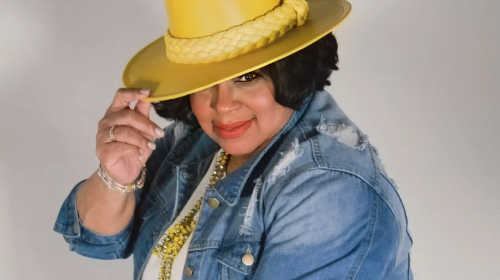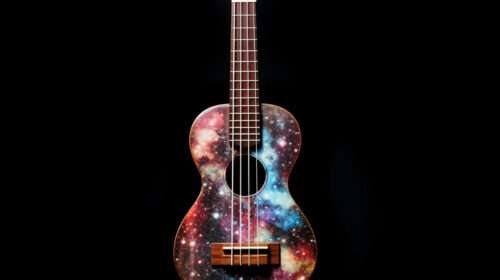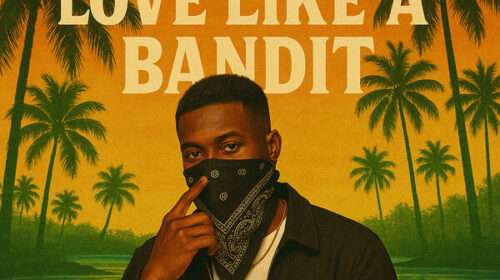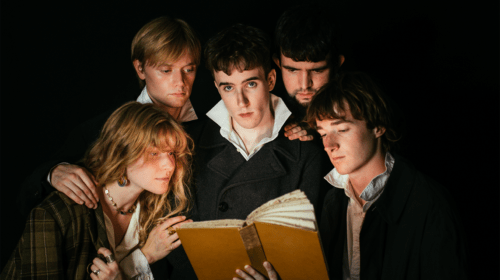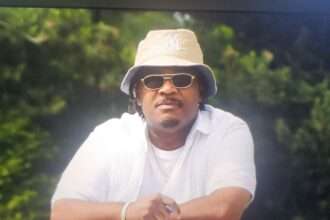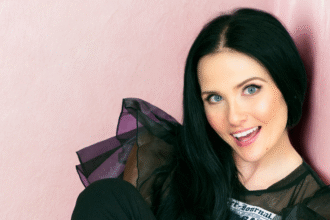Eric Sommer’s journey in the music world has been quite a ride, filled with unexpected twists and turns, but his love for music was clear from a very young age. At just 5 years old, he was inspired to play guitar and started by performing in front of an audience at the USIS Auditorium. This moment was the beginning of a lifelong passion for music.
Eric’s musical adventure took him around the world, from studying in India to busking on the streets of Europe, and eventually back to the vibrant music scene of Boston. He not only honed his guitar skills but also absorbed the diverse sounds and cultures he encountered, which influenced his unique musical style. Whether it was playing in front of small cafes or big stages, Eric’s commitment to his craft and his continuous evolution as an artist kept him moving forward.
In our conversation, Eric shared insights into his creative process, the challenges of being an indie musician, and his distinct approach to songwriting and performance. His story is not just about music, but about a profound journey of self-discovery and artistic expression.
Can you tell us about your journey as an indie musician? What inspired you to pursue a career in music?
Great question, but it would take a few volumes to round that one out! And my journey has been – and continues to be – a thread of coincidences and happenstance, a combination of being in the right place at the right time, only listening to people who made sense and keeping to my schedule of playing in the living room or where I could for hours and hours, reading off the Berklee Guitar Books #1-3 and trying to figure out what David Landau was doing when I’d see him in Harvard Square at The Oxford Ale House with The Chris Rhodes Band.
I started out as a 5-year-old kid with a Sears Silvertone my Dad got me at the PX. I had a few lessons and all I had to listen too was US Marine Band records, Perry Como, a few others Oh, and Stan Freeberg comedy records. One day my Mom took me down to Wireless Road and the USIS Auditorium to see Addison and Crowfoot – and early Americana Duo, and the asked if anyone could play something for them. I got up and played “Stewball was a Race Horse” and I never looked back!
I went away to school in India, at St. Josephs College, Darjeeling, and I bought a Sitar in Calcutta because the sound was so amazing. They took it away from me, but I was captivated by the sound and especially what the Beatles did with it on Sgt Pepper. I didn’t play a lot during my time in India, but I got my head and thinking aligned musically… and that saved me. It was very lonely in Darjeeling, being one of only three American/Canadians and there was very little camaraderie between us and the Sikkimese, Bhutanese, Tibetans, and Bengalis, so music – at least thinking and fantasizing about it – made my years there tolerable.
When I got to the US, I was in heaven. It was the incredible music scene in Boston that captured me while I was still in High School in Lexington, MA. I would spend every weekend in Harvard Square, listening to people, playing on a bucket in front of the Harvard Coop, on the steps at Holyoke Center, down on Charles Street, at The Nameless Coffeehouse on Church Street and at Passim’s Coffeehouse, then run by Bob Donlin. Soon enough I went to college in New Jersey, and a few years after that back to SE Asia.
When I left Bangkok, I worked my way through Tel Aviv, then Greece and Athens, and up to Geneva, where I stayed and made a few friends playing music and writing songs. Eventually I moved on, hitchhiked up to Amsterdam, and played on the streets in and around the Dam Square, and lived on a houseboat behind the train station. I got busted one afternoon, since I was making so much money, and they took my guitar away. I had to hire a lawyer and it was going to take about 3 months to get it back.
So I left Amsterdam, hitched up to Aarhus, Denmark and ended up living there for three years. I didn’t have a guitar, so a friend lent me one and I rehearsed for weeks in the sauna rooms at The University of Aårhus; I eventually got three gigs a week on a regular basis and wrote all my oen songs, played all my own material and did very well, and when it was time to head back to the US, I had a boatload of Danish Krone and landed in the US with some cash. I ended up back in Boston, and this time I was getting good shows immediately, ending up with Don Law, the biggest promoter in the area. I worked with him on and off for 15 years, touring with everyone from Little Feat to John Mayall and then back in Europe with Nick Lowe and Dave Edmonds, The Pretenders and John Hammond Jr.
By the time I had formed The Atomics, we were already a known quantity, and we were put on tours with Mission of Burma, Gang of Four, The Dead Kennedys and Orchestra Luna… that went on for almost seven years, and then I had to get out.
The stage show was getting in the way of the music – I was writing and playing alright but not making progress and the punk/new wave scene had made its mark, scorched the earth, and moved on. There wasn’t much left, and I had been living in a South Boston Loft with no heat and no hot water, and I had enough.
So I shifted gears to Washington DC, dried out, quit smoking and drinking and got back to my acoustic guitar roots and never looked back. If you’re not improving, developing, and making a difference, what’s the point, right? I got back to my original loves of writing songs, playing acoustic guitar to small intimate audiences, and went back on the road to The Bayfront Blues Festival in Duluth, MN. I toured solidly for the next 10 years, ending up Chapel Hill, North Carolina, where I played a steady series of shows up and down the East Coast.
I formed “Eric Sommer and The Fabulous Piedmonts” a year ago, and we are recording and making new music daily. We are touring and I am writing constantly, working in and out of Nashville, left SESAC for BMI, and I am enjoying my new sound, content, and musical writing process more than ever.
This is a journey, not a race.
How would you describe your unique style and sound as an artist? What sets you apart from other musicians?
My musical catalog is a combination of all my influences, run thru a meat grinder, and then rolled up into individual songs… I have a very unique sound because I incorporate my acoustic guitar skills – finger-style, slide, open tuning – into a pop sound with a driving rhythmic center. That’s fairly unique, although there have been many who attempted to do hat: the band YES comes to mind, and The Band too, with Robbie Robertson.
There may be people out there who have a similar sound, but I have not heard anyone who comes close to doing what I do.
My sound has been developing for years: I began life as an acoustic player, and at 13 years old I was very much influenced by Jorma Kaukonen (Jefferson Airplane), Davy Graham, Steve Howe (YES), and Bert Jansch, John Renbourn and Pete Seeger. After years of being in that sphere, I discovered the singer/songwriter lioston when I discovered The Cars, and their fresh, highly crafted New Wave sound was the door I had been looking for, so I tried to blend the acoustic precision I had developed with finger style playing with the raw power of a Telecaster and a stack of amps.
It was freedom! It was sonic liberation and exhilarating and crazy and loud and expressive and at once joyous, joyful and held so much promise.
Then over the following months I tried to blend the acoustic with the power of the Eliot Easton type of New Wave beats, the exciting feel from Nick Lowe and Dave Edmunds and the work they had done with Wreckless Eric and Bram Tchaikovsky and of course Elvis Costello. With various bands and ensembles, I have fronted, the feel of those influences is always present in all the musical arrangements I write and all the songs I have written.
When I was very focused on becoming a strong electric guitar player and developing the technical skills to play what I wanted to play and what I hear, I listened to Charlie Christian. I found out about his sound by listening to David Landau in Cambridge, and I loved the fluid, triad-based lines that Christian was playing. So, I sat in the front room of my apartment in Brookline. MA and played 5-7 hours a day for two years and smoked 2-3 packs of Winston’s a day while I devoured the Berklee Guitar books I, II and III.
So I put my acoustic stylings in the mix with my love of New Wave rock-steady, added in the Charlie Christian stylings I’d been working on for years and the smooth groove of Robben Ford and Charlie Musselwhite and that’s my sound.
Could you share some of the biggest challenges you’ve faced as an indie musician and how you overcame them?
There are so, so many, but look, here’s the thing: I have built my life around this from very early on, and I count every day as a positive learning and growing experience. I want to have a full, exceptional life, and to do that I try to be fully engaged in everything I do.
There are new challenges every day, and in booking shows, getting to the shows, everything is complicated at some point the busier you get; but you need to keep your eye on the goal, whatever that is that you set for yourself. There are frustrations and disappointments at every turn, and to survive that, and maintain a cheerful, positive attitude, you need to be fully engaged and be constantly working on the product: you and the music you are creating.
This is a hard business. It’s made harder by a flood of singer-songwriter types who have been influenced by, say, someone like Taylor Swift, and believe that with 3-5 simple chords they can have a career. Those days are long, long gone.
But for the pros and the long-time working players, it makes it more challenging to maintain a career you’ve been developing for a lifetime. Don’t get me wrong – all those new young players are a great boost to the music suppliers, but what I am talking about is the value they bring to the table. And the bottom line, as Joan Baez said in the wonderful Bob Dylan film, is this: what do they have to say?
Let me put that in perspective: I can’t learn anything from Demi Lovato. The same goes for Taylor Swift. For me, there’s no lasting message, no words of meaningful communication, no memorable confirmation of values, or a universal theme. That is a fundamental of good songwriting and it just seems to skip a beat from my perspective.
What is your creative process like? How do you approach songwriting and composing music?
There are many ways to get that song out, and sometimes it’s easy, sometimes the song writes itself, and other times it is hard – here are some approaches I use from time to time… I start writing every morning at 6:30 or so, never later than 7:00am. My head is fresh, the vision clear and I dig right in. To warm up – if necessary – I look at a series of pictures, Edward Hopper is my favorite, and I go over stories in my mind about what is taking place in the scene before me.
Then I might look thru early comic books or the newspaper – there are lots of interesting headlines and sub-heads that get the motor running and the ideas flowing. Once something grabs my attention, I focus in, and I may write a series of song titles and then try a chorus or a middle eight based on the ideas before me. If I am stuck, I have a large bag full of story ideas, song titles, interesting scraps of paper and notebooks full of ideas and lyrics, words that I find interesting and sets of words that convey some sort of emotion… I have been collecting these for years, so I am never out of source material, and always have what I think is one of the best emotional and wordsmithing references at my fingertips: Shakespeare: The Invention of the Human, by Harold Bloom.
When I am stuck on anything: character, emotional eloquence, a phrase, or a hint of a phrase tied to some emotional twist I need to finish a line, a moment in those pages works very well. Give me ideas, gets my engine back up and running.
Are there any particular themes or messages that you aim to convey through your music? What inspires your lyrics?
My eyes have always been drawn to the work of Edward Hopper; his world of people, images and the stark inter-relationships between interior, exterior and surrounding imagescapes is something that has captivated me ever since I first saw his work. I am drawn to the images of empty rooms, bare walls, empty streets, and empty cityscapes he portrays; I see that in my own surroundings, although my situations and people are far more real but, in many ways, just as empty and stark. I try to write to those feelings, I try to write to the situations around me that appear to be reflections of the interior emptiness of Hoppers’ people, places and things.
I am always interested in the human story, from a gas station worker to the guy next door and his or her bartender. It’s the human-interest stories, stories of battles fought, battles won, and in the true Shakespearean model, I like to see what has changed the hero of the story after crawling thru the wreckage. Is he better or worse for the experience, and if so, then how?
Narratives are something I enjoy writing – songs that tell stories, songs that have a moral or lessons or maybe they have neither; maybe they are merely tales told, and life goes on. I love the narrative, either interior or exterior: the lonely and downtrodden, the struggling towns and villages and the people who make up those struggles and how they overcome the obstacles put in their path, either by themselves or their detractors.
There are so many themes, so many points of view I try to incorporate and dissect, take apart and put back together in new and different musical, emotional and lyrical ways. Naming them, identifying them and putting a thumbtack through them so they can be put up on the board and studied, thought about and copied is exactly what this highly personal and emotion creation is not going to be put through.
And that approach is incredibly superficial. It’s not authentic, and I guard my authenticity carefully and forcefully.
So, the best thing I can say about this question is this: take a listen to all my songs. Read my bio on the website
What themes can you identify?
What are your long-term goals as an indie musician? Where do you see yourself and your music in the next few years
I want to create a productive life for myself – I want to write good songs, keep playing live and make records. And, in the process, I’d like to think I am making a difference.
There are many kinds of success. Making money is a very small part of that success. Sure, you need to live, but the richness of my creative life isn’t based on money – it is based on fulfillment, on your contributions to society, on the amount of joy you derive from doing something that you love!



